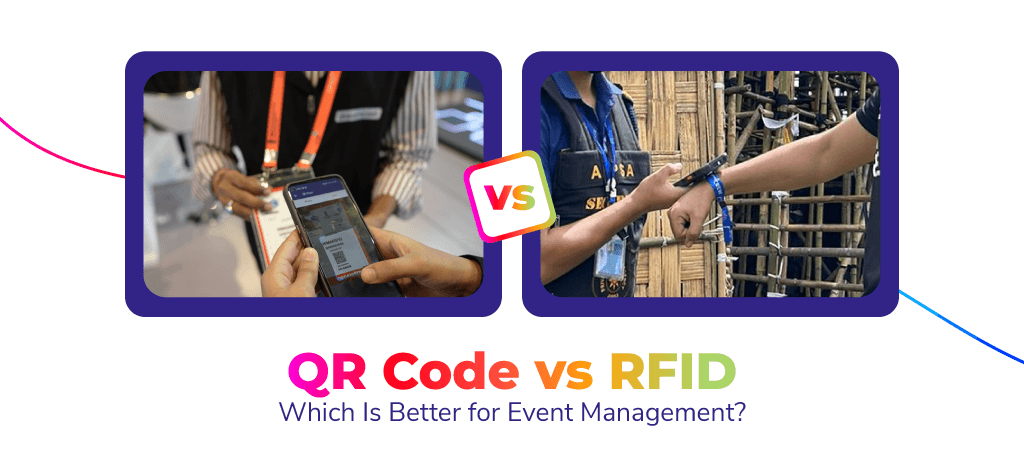An organization’s effectiveness depends on its ability to manage events effectively. Technology breakthroughs have given firms more alternatives for keeping an eye on and managing their assets. QR codes and radio frequency identification (RFID) are two common technologies used in event management. Even though every system has benefits and drawbacks; choosing the right one for your company may have a big impact on your asset management practices.
Table of Contents
What Is a QR code?
A QR (Quick Response) code is a two-dimensional barcode that is readable by smartphones and dedicated QR readers. It stores data as a series of pixels in a square grid and can be used to display text to the user.
Advantages of QR Codes for Event Management
OR codes offer a multitude of advantages specific to particular businesses. We’ll go over the more universal benefits that are applicable to the majority of organizations.
Cost- Effective
The cost of creating QR codes is low. QR codes are cost-effective for small enterprises and startups because they don’t require additional funding or resources to create.
QR codes are also quite flexible. They can be used for marketing as well as inventory management and don’t have to cost a lot of money. They are accessible tools for improving consumer interaction and optimizing operations due to their affordability. As a result, adding QR codes to business plans can have a significant positive impact without breaking the bank.
Easy to Create
In contrast to RFID technology, QR codes are simpler to create and utilize. Anyone can simply learn how to generate and utilize a QR code by using the online QR code generator.
Furthermore, QR codes can be created easily without specific equipment or technical knowledge, making their use accessible to a wider range of industries and skill levels. Online QR code generators enable people and organizations to quickly create codes that are specific to their needs. QR code promotes the wide acceptance and creativity of QR code applications.
Can Hold Different Multimedia Formats
Modern QR code technology supports a variety of multimedia forms. Emails, papers, photos, audio and video files, URLs, and WiFi access are all included in this.
Because of their multimedia capabilities, QR codes can be used for purposes other than text or website links. QR code gives users engaging and interactive experiences. Businesses can use this ability to enhance communication and audience engagement by providing high-quality content. QR codes can encode a wide range of forms, as they are effective tools for communicating information in a variety of circumstances.
Mobile-Ready
The ability to access web content by scanning QR codes with a smartphone is one of its many wonderful features. This puts the ability to obtain information from a QR code at your fingertips.
Convenience and accessibility are increased by this mobile event app integration, as users can interact with content or rapidly get information by just scanning the QR code with their cellphones. The seamless integration of QR codes into mobile event apps—whether on printed papers, in real businesses, or at events—enables quick and easy event check-in. QR codes continue to be a well-liked and easily accessible method of bridging the digital and physical worlds as smartphones become more and more common.
Disadvantages of QR Code
Limited Range
Only a small distance is necessary for QR codes to be read, usually requiring a direct line of sight between the code and the scanner. This constraint limits their use in situations when the scanning equipment cannot be positioned in close proximity to the code.
Limited Storage Capacity
However, there is a storage capacity limit on QR codes for event management. This restricts the amount of data that can be encoded into a single code.
What is RFID?
A kind of wireless technology called radio-frequency identification (RFID) uses radio waves to read embedded data. Some people still use it now to track the movement of items and open doors.
Advantages of RFID for Event Solution
Secure Data Dissemination
The ability to distribute data securely is one benefit RFID may offer its users. The data they encrypt and decrypt requires specialized technology, such as a microchip, which they insert into keycards. RFID offers safe data distribution because of its strong security features.
This technology additionally protects data integrity and confidentiality during transmission and storage by providing encryption capabilities. RFID is therefore a recommended option for applications needing high degrees of privacy and protection against unwanted access due to its secure data distribution capabilities.
Convenient to Use
Similar to barcodes, RFIDs are easy to use. Since it simply takes a few seconds to unlock doors, transfer money, and do other things, people have no trouble utilizing them.
RFID’s simplicity is further enhanced by its ease of integration with current systems, which allows it to be used in a variety of applications without requiring significant adjustments. Furthermore, in certain situations, RFID for event solutions permits hands-free operation, making transaction processing or access control simple. Also, attendees can use an RFID wristband for events which makes activities easier and improves user experiences. It is widely adopted in a variety of industries and daily use cases. This is due to its convenience and efficiency.
Easy to Carry
You won’t have to worry about carrying keycards in your pockets or wallets because the majority of RFID-powered devices are in the shape of cards. The majority of keycards are designed to fit into the typical wallet sizes used today, so their portability and ease of use do the users excellent justice.
RFID keycards are lightweight and small, making them easy to take around without taking up extra space in users’ pockets or luggage. The ease with which users may access their RFID-enabled devices or systems at any time increases their utility and practicality in day-to-day living. Customers may profit from RFID technology without having to alter their current way of life by using RFID keycards.
High Data Capacity
Large amounts of data can be stored with RFID technology for events, which makes it an ideal solution for events. This technology needs to keep a lot of information about attendees, sessions, and activities.
Additionally, RFID’s capacity to retain a variety of data types guarantees flexibility in customizing event experiences to target certain goals and cater to audience preferences. By using RFID technology’s vast data capacity to create individualized and immersive event experiences. Also. event planners can improve attendee engagement and streamline operations.
Automated Tracking
RFID makes it possible to automatically monitor attendees’ movements throughout an event site. This tool is helpful for fine-tuning event arrangements for upcoming improvements, as well as for examining attendance trends and popular parts.
With the use of RFID for event solutions, event organizers can instantly optimize resource allocation and audience flow monitoring in real-time. By locating bottlenecks, enhancing navigation, and guaranteeing efficient traffic flow across the venue, this data-driven method improves event efficiency and guest happiness. Moreover, event planners are able to make well-informed decisions and execute focused plans that improve the entire event experience thanks to the data gained by RFID tracking.
RFID Limitations
Larger Initial Costs:
Installing RFID systems for events necessitates a bigger upfront cost, which covers the cost of RFID readers and tags. If money is tight for an event, it can be worth considering this first investment. The whole budget should account for the additional expenses associated with RFID technology, such as personnel training and software integration.
Limited Read Range Accuracy
The accuracy of an RFID read range can be affected by a number of factors, including tag proximity, and interference. Event planners need to thoroughly construct and test the RFID infrastructure to guarantee dependable operation.
QR Code vs RFID: Differences
The differences between QR Codes and Radio Frequency IDs are numerous. We’ll examine some of the most significant distinctions between these two technologies in this section.
| Elements | QR Code | RFID |
| Data Storage | Ranges from a Few Bytes to Several Kilobytes | Ranges from a Few Bytes to Several Kilobytes or Even More |
| Technology Used | 2D Barcode System | Radio Waves |
| Capacity and Speed | Holds less Data than RFID tags | RFID tags can hold more data and be read more quickly |
| Security | Can Replicated or Tampered | Can be Encrypted and Data can be Protected |
| Application and Usage | Used for ticketing, tracking shipments, etc | Used in Supply chain management, Access Control |
| Reading Method | Scanned using a smartphone or Zapping machine | Transmit data wirelessly to an RFID reader using radio waves |
| Range and Interaction | Require Close proximity between the scanner and the code | Can be read from a few centimeters to several meters away |
| Cost and Scalability | Scalable and can be produced in large quantities at a low cost | Cost depends on the type of RFID system and range requirement |
The Bottom Line
In conclusion, there are certain benefits and drawbacks to event management with both RFID and QR codes. RFID can be expensive and requires specialist equipment, even though it offers long-range tracking and improved security. Conversely, QR codes for event management are inexpensive and simple to use, but their range, robustness, and security are all constrained. Each of these technologies has specific applications and uses for various types of enterprises. Your situation and other factors will determine which is ideal for you. Knowing the differences between QR Codes and RFID tags can help you choose the one that is ideal for your business. Knowing what you want out of your system is critical in determining the best solution for you.
Create an Extraordinary Event Experience
Across All Event Formats





















